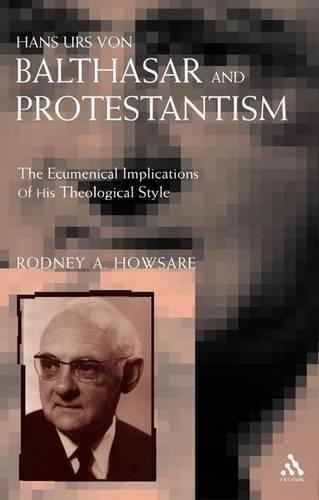Overview
"Hans Urs von Balthasar and Protestantism examines Balthasar's engagement with Protestantism, primarily in the persons of Martin Luther and Karl Barth and explores the implications of this engagement for Fundamental Theology. At the very root of Luther's confrontation with the Catholic Church of the late Middle Ages lies his antipathy for Aristotle and for ""natural theology"". In other words, the Protestant difference has as much to do with its suspicion of the Catholic treatment of faith and reason as it does with the Catholic treatment of faith and works. This is a suspicion that is only exacerbated in Barth's association of the ""analogy of being"" with the Antichrist. Balthasar takes these criticisms very seriously, and, in addressing them, not only has much of relevance to say about the Catholic-Protestant differences, but also about the Yale-Chicago differences. In short, this study shows how Balthasar's dialogue with Luther and Barth sheds light on the impasse that has arisen between the so-called ""correlational"" and ""revelocentric"" schools of contemporary theology. If, indeed, Christ is the ""concrete universal,"" then, it argues, we should not have to decide between the two."
Full Product Details
Author: Rodney Howsare
Publisher: Bloomsbury Publishing PLC
Imprint: T.& T.Clark Ltd
Dimensions:
Width: 13.80cm
, Height: 2.30cm
, Length: 21.60cm
Weight: 0.476kg
ISBN: 9780567030191
ISBN 10: 0567030199
Pages: 256
Publication Date: 01 August 2005
Audience:
College/higher education
,
Professional and scholarly
,
Undergraduate
,
Postgraduate, Research & Scholarly
Format: Hardback
Publisher's Status: Out of Print
Availability: Awaiting stock

Reviews
Rodney Howsare's Hans Urs von Balthasar and Protestantism belongs to the exciting new wave of Balthasar studies in which the great Swiss theologian is interpreted rather than simply exposited. Howsare uncovers the ecumenical possibilities of Balthasar's theology by showing how crucial is Balthasar's engagement with the thought of Luther and Barth. Howsare shows with exceptional economy how this engagement helped to promote a positive view of Protestantism, assisted Catholicism in its self-critique, while at the same time sharpening rather than blunting the real differences between Protestantism and Catholicism on such important issues as the relation between nature and grace, creation and redemption, and Christ and culture. In doing so, Balthasar instantiated a mode of ecumencal dialogue that demands attention as we seek away beyond tendentious rhetorical and an accommodationism that respects the integrity neither of Protestantism nor Catholicism. This is a fine book. The voice is inte
Author Information
Rodney A. Howsare is Associate Professor of Fundamental Theology, DeSales University, Center Valley, Pennsylvania, USA.



